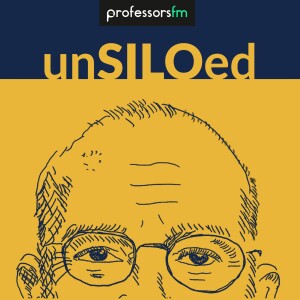
234. How Middlemen Dominate The Economy feat. Kathryn Judge
 2023-01-16
2023-01-16
Whether we are talking about food, clothing, or financial products, the supply chains which convert the raw materials to finished goods are getting more and more complex, giving rise to a wide range of intermediaries, ranging from the Walmarts and Amazons of the world to the Etsys and the Kickstarters. Increasing complexity often means increasing opacity. Regardless of the industry, understanding where our stuff comes from requires an understanding of intermediation design.
Kathryn Judge, a Columbia law professor who researches financial markets, explores the complexities of our modern economy and supply chain systems in her new book Direct: The Rise of the Middleman Economy and the Power of Going to the Source. She joins Greg on this episode of unSILOed to talk about consumer habits in our modern economy, how convenience changed the world, and the sociological impacts of this convenience.
Kathryn Judge is the Harvey J. Goldschmid Professor of Law at Columbia Law School. Her academic work focuses on financial institutions, innovation, and banking.
Episode Quotes:Defining the middleman economy
03:31: When I talk about the middleman economy, it's really two phenomena that build off each other. One, are they increasing the scale of intermediaries? Whether it's large banks, Walmart, or Amazon. And then how the scale of those largest intermediaries justifies changes in the process of production quite often where it becomes more disaggregated so you get the longer and the complex supply chains, and then how these two patterns feed off of each other.
38:09: Even though we're seeing a shift in consumer and investor demands, conscious consumerism is not going to solve the structural challenges we're facing right now.
There is always somebody on the other side of your transaction.
28:34: There are people and places behind all of the goods that we're bringing into our lives. And once you start to reawaken that awareness, that becomes a mechanism for also helping to build a political will to think about, "Well, what do we want those structures to look like?" And what are the tradeoffs we're willing to make, and what are the tradeoffs we don't want to make?
Using technology to enable disruption to intermediation schemes
21:58: We are seeing technology being used in different ways. On the one hand, you do have these large intermediaries, like Amazon and Walmart, that we think about that are doing an incredible amount with data in ways that are helping to strengthen their position. At the same time, we are seeing technology come in and enable a disruption to some of the largest and most entrenched intermediation schemes and enable a different type of exchange.
Show Links:Recommended Resources:- Faculty Profile at Columbia Law School
- Kathryn Judge’s Website
- Kathryn Judge on LinkedIn
- Kathryn Judge on Twitter
- Kathryn Judge on Google Scholar
- Article on Time Magazine
- Article on GreenBiz
- Direct: The Rise of the Middleman Economy and the Power of Going to the Source
More Episodes
Create your
podcast in
minutes
- Full-featured podcast site
- Unlimited storage and bandwidth
- Comprehensive podcast stats
- Distribute to Apple Podcasts, Spotify, and more
- Make money with your podcast
It is Free
- Privacy Policy
- Cookie Policy
- Terms of Use
- Consent Preferences
- Copyright © 2015-2024 Podbean.com






